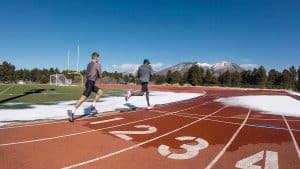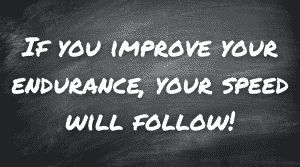
Most Runners can INCREASE their speed without running more speed workouts.
Ok. Hang in there with me, I’ll explain.
In my experience, runners spend most of their time trying to improve their speed.
I can’t blame them, it feels GOOD to knock out a hard workout. Some people crave gut-wrenching runs. They are invigorating!
But, faster is not always better.
I’ll admit, there is a satisfying aura around absolutely crushing it.
But, like anything, a boundary must be drawn.
There is a limit to how much speed is essential and beneficial for your progress.
Speedwork (and I’m talking Mile to 5k efforts), will often provide a quick hit of progress, typically lasting anywhere from 2-4 weeks. It will leave you feeling sharp and ready to go!
But, if this intense training continues, runners often find themselves feeling sluggish, struggling to progress their workouts, and even underperforming during races.
The speed that once felt natural now feels like drudgery.
As runners, we hate this feeling.
No matter how hard you work, training and racing are just not getting better.
So what does this tell us?
It tells us that in most runners, speed is NOT what is holding you back.

It’s endurance!
We are talking about the ability to not only run FAST but also have the ability to run fast for a longer distance.
Every event from the 800m up is reliant upon endurance!
I know Milers who run 90 miles per week, and I know marathon runners running 140 miles per week!
Curious about what a 140-mile week looks like?
Regardless of the event, aerobic development (aka more mileage) plays a significant role across all distance events.
I was fortunate to make this realization very early in my running career.
After suffering through a track season of IT band pain, I was forced to take a step back from hard runs, multiple times per week.
Instead, I spent the summer building up my mileage.
During that time, I went from 20 miles per week to 50 miles per week. No speed workouts, not even strides! Just easy running in the North Carolina heat.
I ran 2.5 minute PR in my first race of the season.
I was onto something!
Every time my mileage dipped and my speed work increased, I saw positive results for the first few weeks, only to be followed by a spell of fatigue and disappointing workouts.
The writing was on the wall.

I couldn’t spend ALL my time running race -pace workouts. I needed to put most of my focus into building endurance with just a sprinkle of race-pace during the final weeks of my season.
Where Runners Go Wrong
Most of my newer athletes come to me wanting to increase their speed.
They believe this is the reason they are struggling to improve their race times.
They claim they were in great shape, running PR times, at the beginning of their plans, but as the weeks passed, they failed to meet their performance from the first race of the season.
Coach Ben Rosario of NAZ Elite put this thought-process into perspective when he said:
“The natural tendency is to get going on workouts right at 5k or 10k race pace. Things like 400, 800, or 1k repeats at the exact pace you want to run on race day. Here’s where the counterintuitive idea comes in though. It’s been my experience time and time again that too many of those sessions leave athletes flat and do not put them in a position to perform at their best.”
What puts these athletes in the best position to perform is a steady diet of long-aerobic training (think tempo runs and threshold intervals), shorter speed maintenance (short Hills, strides, and 200-meter repeats), and just a touch of race-pace in the final weeks of training.
I’d say high school me did a pretty good job!

“But Coach! If I run more mileage I will lose my speed!”
I hear this one a lot!
The truth is, you can maintain your speed all year long without any negative repercussions, even if you are running more mileage than ever before. It just comes down to timing.
For runners experimenting with higher volumes of training, keeping in touch with speed during the week can be as easy as throwing in short strides or hill-sprints.
How to improve your finishing kick
The additional miles will even help your finishing kick as well. The greater your pool of aerobic resources, the greater chance you will get to the end of the race with gas left in the tank!
This is how runners, despite rarely running faster paces in practice, can run at blazing speeds to kick in their last 400 meters (sometimes up to a mile).
I’ve experienced this myself.
Last week I ran my first 5k in almost 3 years!

After taking a month off of training due to Mortons Neuroma surgery, I slowly worked myself back into training these past 12 weeks.
I focused heavily on increasing my volume and including short workouts, such as 200 meter repeats at mile pace and 1-minute reps around 15km effort.
I did ZERO 5k specific workouts.
One day, I nearly threw up attempting to run a 70-second 400-meter repeat!
Despite my lack of “specific” training, I ran 14:49.
That’s 4:46 per mile pace. I even closed my last 400 in a 67!
There were no signs in training to suggest I would run this time, NONE.
But, what it should tell you is through training your aerobic system effectively, you will give yourself the ability to race at a higher level.
It’s all about being able to extend your speed!
Sure, you can crank out 400-meter repeats.
Yes, you can crush race-paced workouts.
But, without the base mileage and strength, it will be hard to put everything together on race day when speed isn’t the limitation.
Let’s put it into practice
Alright, let’s say I have convinced you low mileage, high-intensity training isn’t as glamorous as it was thought to be.
I think it’s pretty clear why distance running in the U.S. took a plummet in the 90s! We traded away our prized possession: Aerobic training.
We took a poor deal, and our running suffered because of it.
So, let tackle it.
Plan Periods of Mileage Building
It’s that simple. Make time each year to build your mileage effectively. In my experience, aiming to increase volume by 10-15 miles per week is a strong, annual average.
Incorporate Strength Building Workouts
We know running at an easy pace does most of the work for our aerobic system, but to take your training a step further, you should regularly include workouts that help promote further gains in endurance.
Tempo runs, tempo intervals, fartleks, and lactate threshold intervals are great for extending endurance and increasing your ability to sustain a faster pace.
Build and Maintain
During periods of heavy training or racing, focus on what matters most and maintain all other training. If you have a 5k race coming up, you don’t need to continually build your mileage and run more strength workouts. Once you have built up a strong base of training, you can do a little less during periods where racing needs to be emphasized.
Get Help From a Professional
Training can be confusing. Not everyone knows or wants to know exactly what to do! It’s a headache trying to figure out exactly when or how to do a workout.
That’s why I coach. I help runners learn and apply the right strategies to propel their training. Every step of the way, every week out of the year!
Forget the guesswork! I will teach you and show you EXACTLY how to train. Anytime, any distance!
All it takes is the want to get better, that deep desire to reach your potential.
Conclusion
The backbone of successful distance runners is a layer of aerobic training. For nearly 100 years this has been the bread and butter of athletes on the highest stage!
This includes a hefty dose of running mileage and intelligently planned workouts to increase your ability to sustain faster speeds and reduce the build-up fatigue-inducing byproducts.
So, whether you are a miler or a marathoner, it’s always beneficial to go back to the basics and take the time to build up your strength and endurance.
If there is one thing you can do to improve your speed this year, it’s dedicating the appropriate time to improve your strength.
Perhaps it’s time to rethink your training strategy and turn your strength into your speed!
What benefits have you seen by taking the time to improve your overall endurance and strength?
Are you feeling stronger during your workouts?
Were you able to remain healthy and strong throughout the year?
Did you set a new personal best?
Let me know below what strategies you have taken and the changes you have made to achieve your goals.




4 Responses
Hi Jeff, I have used one of your training programs successfully in the past. Yours, McMillan, Jack Daniels all feed the athletes with a steady diet of endurance workouts. It works.
I use a Garmin watch and the fitness programs continuously tell you that, without more anaerobic training you are losing fitness! It even predicts a slower 5K time without a change in training.
Your article helps me understand where Garmin is going wrong.
I’m happy to help, Kim! Our garmins are tough on us runners. I have never found my watch to accurately predict my fitness. There are just too many factors to consider. The best thing we can do is to focus on our training and trust our coaches, and more importantly, trust ourselves. I’ve always got the best out of training when I focused on myself and the effort put forth.
I lived this great advice. I struggled with feeling slow. My up tempo or stamina workouts were so painful. Then I trained for and completed a half iron in June 2015. I didn’t care about speed…I trained to be upright at the finish. I recovered and then trained for a September Oly and then kept up with my running mileage to end the year with a marathon. That November I ran my second marathon and qualified for Boston without even intending to!
That’s awesome, Justine! There is reason why we go back to the basics: they work! Glad to hear your firsthand success story, thank you for sharing 🙂